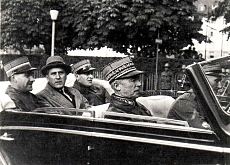Blocher defends Swiss armed neutrality

Justice Minister Christoph Blocher has called on the Swiss to hold on firmly to independence. His appeal commemorated a historic speech at the Rütli meadow.
The speech of July 25, 1940, was a call from General Henri Guisan, commander of the Swiss armed forces during the Second World War, for senior officers to remain resolute and ignore defeatism.
In front of a crowd on Sunday estimated at up to 2,000 at the Rütli meadow, a symbol of Switzerland’s geographic and spiritual past, Blocher praised Guisan’s strategy which had deterred Hitler from attacking Switzerland.
Media speculation that the event, organised by conservative groups, could be interrupted by rightwing extremists a week before National Day celebrations at the Rütli, proved unfounded.
Blocher, a figurehead of the Swiss People’s Party, recalled that in 1940 Switzerland had unreservedly proclaimed its independence and neutrality despite the threat from outside its borders.
Self-determination
He said that this affirmation of freedom had shown the way forward and given courage to the Swiss to determine their own future.
And he questioned why that should be different today, although he admitted that at the time Switzerland had committed what were now considered errors.
“Far from being faint-hearted, let us show a determined ‘yes’ to an independent Switzerland and 700 years of freedom,” said Blocher.
Basel-based historian Georg Kreis criticised Blocher’s Rütli speech and accused the cabinet minister of cultivating a “myth of independence”.
“I can only advise Blocher and those who were applauding him to read the preamble to the federal constitution,” Kreis told the Tages-Anzeiger newspaper.
“The preamble refers not only to ‘independence’ but also to ‘solidarity and openness to the world’… [Blocher’s] version of history is simply not up-to-date.”
Criticism
Blocher said he could not understand why the celebrations to mark the 65th anniversary of the Rütli speech had sparked criticism.
He added that opponents feared the consequences of an event that put independence and armed neutrality at the centre of debate.
Blocher told his audience that armed neutrality was the best guarantee for Switzerland’s survival, adding that the country’s stability was a decisive trump card in its international relations.
And he said that Switzerland had to be in a position to protect itself today from foreign armies, as was the case 65 years ago.
swissinfo with agencies
Henri Guisan was appointed general and head of the army by the federal assembly (both houses of parliament) in 1939.
His Rütli speech became the embodiment of the Swiss people’s will to resist. He became a symbol of that determination.
At that time, Guisan proclaimed the redoubt strategy, which meant that defence planning was concentrated in the Alpine region.
In Switzerland, the rank of general exists only at a time of war. Guisan resigned from his position after the cessation of hostilities on May 8, 1945.
According to legend, the founding cantons of Switzerland – Schwyz, Unterwalden and Uri – pledged at the Rütli meadow to act together to defend themselves from outside attacks.

In compliance with the JTI standards
More: SWI swissinfo.ch certified by the Journalism Trust Initiative











You can find an overview of ongoing debates with our journalists here . Please join us!
If you want to start a conversation about a topic raised in this article or want to report factual errors, email us at english@swissinfo.ch.